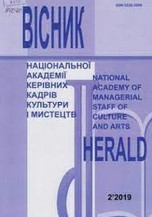ОПЕРНИЙ ТЕАТР ЯК КАТЕГОРІЯ УКРАЇНСЬКОЇ ОПЕРОЛОГІЇ
OPERA HOUSE AS A CATEGORY OF UKRAINIAN OPEROLOGY
Author(s): Guo ChangluSubject(s): Theatre, Dance, Performing Arts, Music
Published by: Національна академія керівних кадрів культури і мистецтв
Keywords: opera house; authorial opera house; national opera house; operology; corporate impresario;
Summary/Abstract: The aim of the article is to develop the explication of an opera house as a category of Ukrainian operology. The research methodology is based on the combination of historical, theoretical, and performance musicology, in particular systemic and terminological approaches. The author has also applied the historical-genetic and comparative methods, principles of the communication theory, and the principle of historical synchronisation. Scientific novelty of the research. The author has systematised the analysed content levels and essential categories; introduced a developed terminological system into the concept interpretation; specificated valued scales and interpretations relevant to the concept’s content levels. As a result, the author has suggested a topical scientific paradigm of interpreting the category of an opera house. The mechanism of making the terminology system of the opera house concept has been defined, which includes the detailed description of its content, specification of local terms and definitions that correlate with it. These terms include the world opera house, the continental opera house, and the national opera house. Moreover, the author has justified the necessity of introducing into the modern Ukrainian operology such terms as the authorial opera house and corporate impresario. The former term implies the interpretation of the opera house concept as «summa summarum» of opera projects (both realised and not yet finished; artistic and scientific-critical), a combination of artistic search and regularities of creative thinking, manifestation of opera poetics and esthetics as the legacy of each specific composer. The latter term specifies the opera house concept as a formation that tackles a number of creative and organisational problems, searching for an effective way of managing the crisis, preparing the opera-theatrical enterprise and professional tours. Conclusions. The article presents a system of interpretations and functions of the «opera house» category within the Ukrainian operology, develops a comprehensive terminology system, and suggests a scientific paradigm of interpreting the category of the opera house. The author also distinguishes five levels of interpreting the «opera house» category that can be observed in the Ukrainian operology: as a category of historical musicology of both continental and worldwide scale, as an authorial phenomenon, namely the authorial opera house, as a architectonic structure that defines the poetics of the «opera city», and as a managerial system created to solve organisational problems and favour successful realisation of the opera performance. It has been established that its content-functional duality as a generic feature distinguishes the opera house category. The opera house appears to be a field for distinguishing international, temporal, topographic forms of dialogue that stipulates for the topicality of a specific interpretation of the opera work at the level of stage and verbal language (implication) in the process of its staging in other national and continental conditions in accordance with the national traditions.
Journal: Вісник Національної академії керівних кадрів культури і мистецтв
- Issue Year: 2022
- Issue No: 4
- Page Range: 123-129
- Page Count: 7
- Language: Ukrainian

